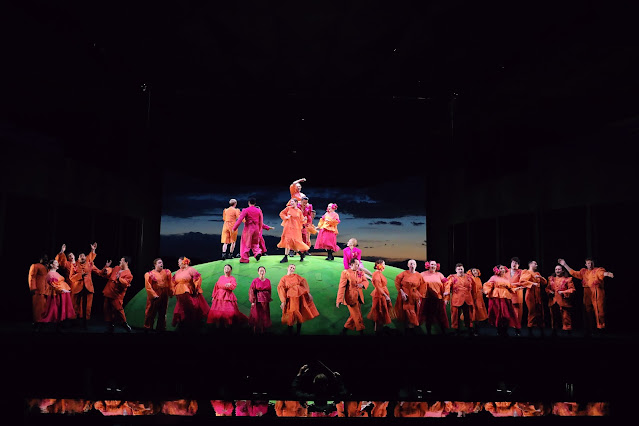 |
| The Santa Fe Opera chorus cavorting on and around the grassy hill set for Act II of Monteverdi's Orfeo. |
RODNEY PUNT
Introduction
Discontent with one’s lot may be the mother of personal reinvention, but the pursuit of human happiness can also set off a struggle with the rules of those who rule the heavens. The gods of mythology don’t cotton to humans breaking the boundaries they have set. Mythological gods “up there” are, in fact, stand-ins for natural and societal boundaries. Two operas this Santa Fe Opera season work on an attempt to break boundaries, Claudio Monteverdi’s Orfeo and Antonín Dvořák’s Rusalka.
When Orfeo’s new bride, Euridice, dies shortly after their marriage, he questions the judgment of the gods and sets out on a journey to restore her to life and to himself. And he makes a bargain with Greek god Plutone to do so. Likewise, Rusalka, a water nymph, longs to be human, and defies the advice of her father Vodník, Spirit of the Lake, not to transform herself into a human. Neither Orfeo’s nor Rusalka’s willful journeys go as planned.
But when Orfeo, to make sure he's not being tricked, impulsively looks back anyway, he loses Euridice forever. He is later consoled by his father Apollo, the god of music (stentorian bass-baritone Apprentice Singer Luke Harnish), who invites him to look down upon her from his starry heavens for all eternity.
But all too quickly La Messaggera (mezzo-soprano Paula Murrihy authoritative in a black cape) arrives to announce Euridice’s death. As she does so, the long black extensions of her dress cover the green lawn in deathly black.
The Schweder and Johnson staging concept earned high marks for its imaginative integration of many locales in depicting the traditional tripartite Hellenic worldview of heaven, earth, and underworld. Kudos also to conductor Harry Bicket for keeping the orchestra’s musical delivery cohesive and lively (in a version of the score for modern instruments prepared by the New York composer Nico Muhly), while the huge cast and stage action moved in all directions.
The story focuses on the delusional quest of the title character, a water nymph named Rusalka (the radiant Ailyn Pérez, soprano), who has fallen in love with a human prince. Not able to find the fulfillment she seeks in the lake that confines her, and having taken a fancy to the human prince who swims in its waters, Rusalka is determined to pursue her fantasy attraction on dry land. Virtually every incident in the unfolding story is seen through her eyes.
Though her father Vodník (plangent bass James Creswell) is aghast at such a prospect, he agrees to help. On her behalf, he enlists the skills of the witch Ježibaba to make Rusalka human. (Raehann Bryce-Davis’s Ježibaba -- Czech for witch -- seems literally bigger than life in her very effective scenes.) Though warned of ominous consequences, including losing her voice on land, Rusalka ignores them, and her reluctant enabler forges ahead. Rusalka literally then becomes the fish out of water she thinks she desires, in her Faustian bargain to gain what she has no right to. At this point, delusion and regret set in.
Not surprisingly, living on land in her prince’s home is a far worse reality than the seeming loveless world of Rusalka’s native water. Her prince (a hilarious waddling and waffling, also hen-pecked, Robert Watson) is a philandering fool who has glass-cased countless former short-term mistresses and does so temporarily with Rusalka. A certain “Foreign Princess” (a haughty Mary Elizabeth Williams) has commandeered the prince’s attention and amatory behaviors.
So, how to get back? Though offered a knife, Rusalka refuses to stab the prince with it, and throws it in the water. But the prince now realizes he genuinely loves Rusalka and appears by the lakeside to seek her. Rusalka joins him, and gives him the kiss he asks for (above), knowing it will now kill him. Shortly after, she returns to the lake she had no business leaving in the first place.
%20cropped.jpg) |
| Monteverdi, c.1630. |
 |
| Dvořák in 1901. |
---ooo---
Review of Orfeo, August 2
Claudio Monteverdi’s L'Orfeo, SV 318, in a prologue and five acts, was premiered in 1607. It was not quite the first opera to be composed, but it is the earliest to remain a somewhat viable theatre piece into the modern era. Its early Baroque-style invention was an astonishment in its day, and holds up well for modern audiences, if modern ears can adjust to the many similar harmonic cadences in the work’s formal structure, the standard practice of the early Baroque era.
The Santa Fe Opera’s production tells the story of Orpheus (Rolando Villazón) who loses Euridice (soprano Amber Norelai), shortly after their wedding, and his determination to travel to the underworld to bring her back to life. He almost does so, but his impulsive nature leads him to violate the edict of Plutone (solid baritone Blake Denson), guardian of the underworld, that he should not look back until they have returned to the land of the living.
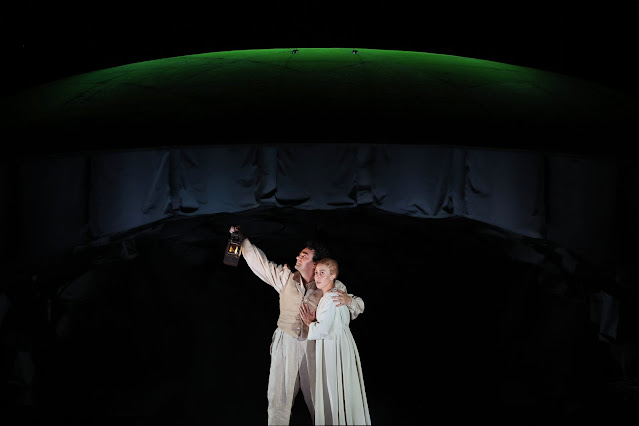 |
| Orpheus (Rolando Villazón) guided to the underworld by Speranza (Lauren Snouffer). |
Director Yuval Sharon and “Visual Environment” designers Alex Schweder and Matthew Johnson created, as their most imaginative stage set-piece of the season, a huge, inverted bowl covering most of the stage. First seen in Act I as a heavenly cloud all in white, its Act II iteration becomes a grassy hill for Orfeo’s earthly wedding. For this celebration, the performers (as gracefully as they could) pranced up standing and slid down (carefully) sitting on the steep green inclines.
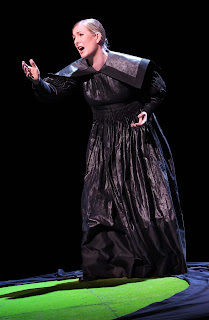 |
| La Messaggera (Paula Murrihy). |
Acts II and III see the dome rise to the stage’s lofty altitude, opening the murky regions of the underworld for Orfeo to recover Euridice. The goddess Speranza (spirited soprano Lauren Snouffer) spurs his journey on with hope. The dome returns to stage level in Act V for Orfeo’s heavenly consolation prize. Orfeo’s self-indulgence may have lost him his Euridice, but he is not destroyed by Plutone. At the invitation of Apollo, Orfeo may gaze down upon Euridice from Heaven.
With 14 named actor-singers, the cast on this evening was the largest of the season, one advantage being that apprentice artists gained solid stage experience in this logistically complicated production. Kudos are also particularly due for tenor Rolando Villazón, back on stage despite sustaining a minor injury in a supporting harness during the final dress rehearsal.
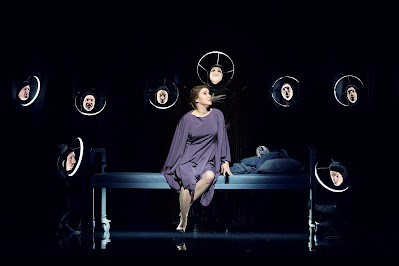 |
| Euridice (Amber Norlai) in the underworld, with eerily-haloed chorus. |
---ooo---
 |
| Lydia Yankovskaya conducts the Santa Fe Opera orchestra in front of Leslie Travers' set design for Dvořák’s Rusalka. |
Review of Rusalka, August 4
The impression one gains from the dramatic score of Antonín Dvořák’s 1901 opera Rusalka Op. 114 is its incredible melodic flow. Its folkloric cautionary tale is gorgeously conveyed in Slavic post-Wagnerian orchestral style, full of exotic atmosphere, glinting instrumental colors, and sensuous textures.
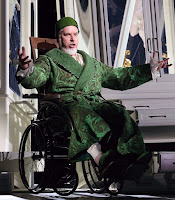 |
| Vodnik (James Creswell). |
 |
| Raehann Bryce-Davis. |
Not surprisingly, living on land in her prince’s home is a far worse reality than the seeming loveless world of Rusalka’s native water. Her prince (a hilarious waddling and waffling, also hen-pecked, Robert Watson) is a philandering fool who has glass-cased countless former short-term mistresses and does so temporarily with Rusalka. A certain “Foreign Princess” (a haughty Mary Elizabeth Williams) has commandeered the prince’s attention and amatory behaviors.
 |
| Rusalka (Ailyn Pérez) and the prince (Robert Watson). |
... and thus a parting warning from the cautionary tales of both Monteverdi’s Orfeo and Dvořák’s Rusalka: be careful what you wish for. Some things are, and must always be, beyond our human desires.
---ooo---
Crosby Theatre, Santa Fe Opera, 301 Opera Drive, Santa Fe, NM, Wednesday,
August 2, and Friday, August 4, 2023, 8:00 p.m.
Images: Monteverdi: Wikimedia Commons; Dvořák: eSbírky.cz–cultural heritage on-line; The productions: Curtis Brown.













No comments:
Post a Comment